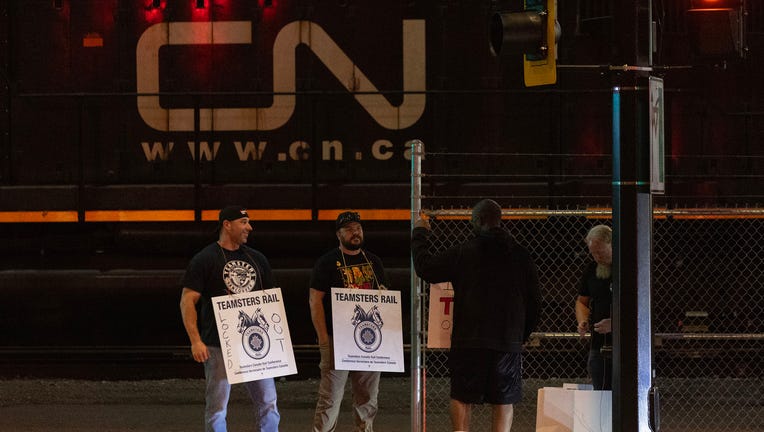Canada rail strike to end after government forces arbitration

Teamsters union members hold picket signs at the entrance of CN Rail Lynn Creek Yard on August 21, 2024 in North Vancouver, British Columbia, Canada. A labor dispute between Teamsters union members and Canadas two main rail carriers, Canadian Nationa
A Canadian railroad strike will apparently be short-lived, as the government has ordered the country's two major freight railroads to enter binding arbitration and find a solution to bring the 10,000 train engineers, conductors and dispatchers back to work.
The government’s action came more than 16 hours after Canadian National and CPKC locked out workers over a labor agreement impasse. Both railroads said they would work to get trains moving again as soon as possible.
The union responded angrily to the order, accusing the railroads of intentionally creating a crisis to force the government to intervene. It also said it would keep its picket lines in place while reviewing the decision.
The government ordered the railroads into arbitration with the Teamsters Canada Rail Conference to end the lockout that began at 12:01 a.m. Thursday after the two sides were unable to resolve the contract dispute.
Here's what we know:
Canada forces arbitration in rail strike
Labour Minister Steven MacKinnon announced the decision to order the arbitration at a news conference Thursday. MacKinnon said he expects the trains will resume moving within days. Ending the lockouts is the first step.
The arbitration process was moving quickly, with the railroads meeting with the Canada Industrial Relations Board on Thursday night, according to a person familiar with the schedule who spoke on condition of anonymity because they weren’t authorized to discuss it. The Teamsters confirmed that the union was also meeting with the board on Thursday night.
All shipments crossing the U.S. border from Canada were stopped on Thursday, but both companies still had trains operating in the U.S. and Mexico.
The U.S. Department of Transportation says those rail lines move billions of dollars of goods between the U.S. and Canada each month.
READ MORE: These aging bridges will be updated, replaced with the help of $5 billion in federal funding
Many companies across all industries rely on railroads to deliver their raw materials and finished products – without regular rail service they would have to cut back or even close.
Manufacturing companies would have to scale back or even shut down production if they can't get rail service, while ports and grain elevators would quickly become clogged with shipments waiting to move. And if the dispute were to drag on for a couple of weeks, water treatment plants all across Canada would have to scramble without new shipments of chlorine.
That’s why the U.S. government kept rail workers from going on strike two years ago and forced them to accept a contract despite their concerns about demanding schedules and the lack of paid sick time.
PREVIOUS: Rail strike in US would have nationwide impact
Teamsters Canada Rail Conference President Paul Boucher criticized the government’s decision to step in so soon.
"The two major railways in Canada manufactured this crisis, took the country hostage, and manipulated the government to once again disregard the rights afforded to working-class Canadians," Boucher said. "The Teamsters Canada Rail Conference (TCRC) is deeply disappointed by this shameful decision."
The railroad companies hailed the decision, saying the government had no choice.
"The Canadian government has recognized the immense consequences of a railway work stoppage for the Canadian economy, North American supply chains and all Canadians," said Keith Creel, CPKC President and CEO. "The government has acted to protect Canada’s national interest. We regret that the government had to intervene because we fundamentally believe in and respect collective bargaining; however, given the stakes for all involved, this situation required action."

